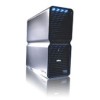Dell XPS 700 Jet Black Owner's Manual - Page 41
Optimizing Performance, Understanding Hyper-Threading, Understanding PCI Express Cards
 |
View all Dell XPS 700 Jet Black manuals
Add to My Manuals
Save this manual to your list of manuals |
Page 41 highlights
Optimizing Performance Understanding Hyper-Threading Hyper-Threading is an Intel® technology that can enhance overall computer performance by allowing one physical processor to function as two logical processors, capable of performing certain tasks simultaneously. It is recommended that you use the Microsoft® Windows® XP Service Pack 1 (SP1), or later, operating system as Windows XP is optimized to take advantage of Hyper-Threading technology. While many programs can benefit from Hyper-Threading, some programs have not been optimized for Hyper-Threading and may require an update from the software manufacturer. Contact the software manufacturer for updates and information about using Hyper-Threading with your software. To determine if your computer is using Hyper-Threading technology: 1 Click Start, right-click My Computer, and then click Properties. 2 Click Hardware, then click Device Manager. 3 In the Device Manager window, click the plus (+) sign next to Processors. If Hyper-Threading is enabled, the processor is listed twice. You can enable or disable Hyper-Threading through system setup. For more information on accessing system setup, see "System Setup" on page 132. For more information on Hyper-Threading, search the Knowledge Base on the Dell website at support.dell.com. Understanding PCI Express Cards PCI Express is the next generation technology for graphics cards and PCI cards. The PCI Express x16 slot is used in place of the AGP graphics card slot. The dimensions of PCI Express card slots are different from those of the PCI card slots, and the cards are not interchangeable (you cannot install a PCI card in a PCI Express card slot, or a PCI Express card in a PCI card slot). Some benefits of PCI Express technology include: • Greater available bandwidth - PCI Express bus bandwidth is 250 MB/s in each direction per lane simultaneously, while PCI bus bandwidth is 133 MB/s in one direction at a time. • Prioritization of service - Multiple PCI cards installed in a computer all share a common bus, but each PCI Express card operates on its own channel. Activities such as video conferencing and web camera functions can be automatically prioritized through the device software to reduce latency. Optimizing Performance 43















